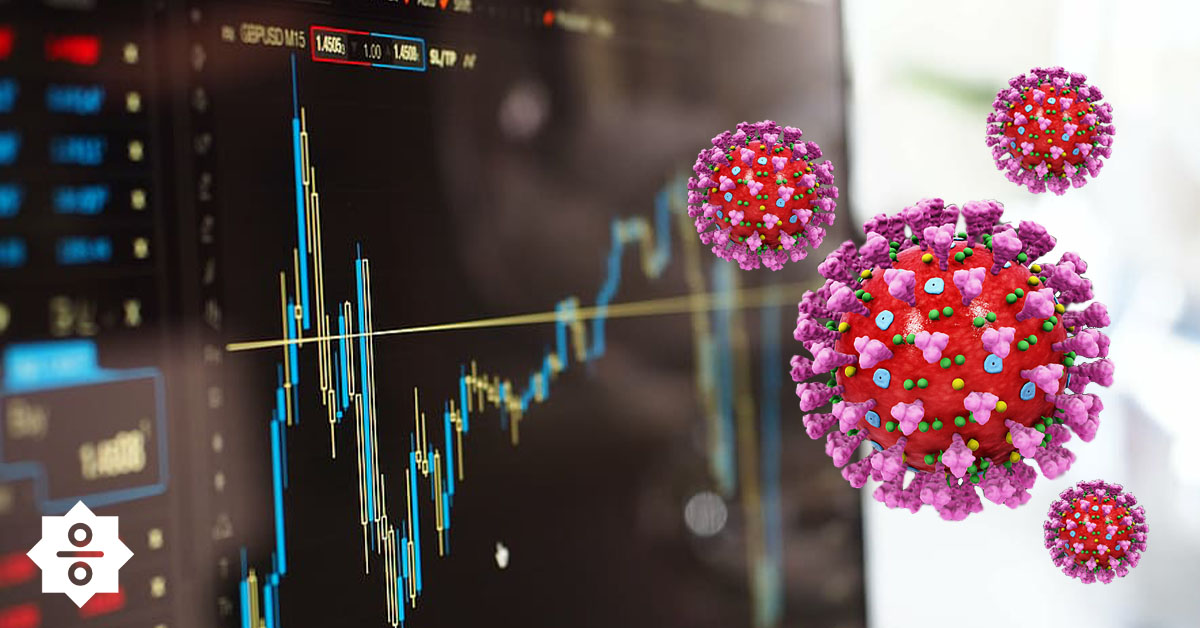Over the past few months the coronavirus has become the main topic in each conversation. In January it started as a concept in Wuhan, China, far away from us Europeans. Currently, it is heavily affecting our economy in Europe and you are asking yourself what we used to talk about. How did all of this happen? In this article, the editors of Faces-Online give a reconstruction of events in the past few months. They analysed the spreading of the virus from Asia towards Europe and the effects that these events simultaneously have had on the stock exchange.
December 2019 – January 2020
The coronavirus started in the Wuhan region in China in December 2019. It all started as SARS-CoV-2 (coronavirus). This virus could cause the disease COVID-19. Even though president Xi already knows about the outbreak at this current point in time, the virus was not disclosed to the world.
At the beginning of January, the first messages of the new virus in China were disclosed. At first, the news was barely spread by the international media. Together with the World Health Organisation (WHO), the Chinese authorities have started to investigate the coronavirus. Worldwide, the first measures were taken to prevent the further spreading of the virus. From January 22 onwards, the daily number of infections and deadly victims are shared by the governmental channels, so the foreign media also gets a more clear image about the dangers of COVID-19. On January 22, in total 580 infections are determined and announced, of which 571 in China.
Financial markets: From the 21st of January and onwards, stock exchanges in China show red numbers in fear of the consequences of the Coronavirus. As a result, stock markets in Europe are also falling, as many companies have interests in companies that are affected by the measures in China. Naturally, the manufacturers of air cleaners and other protection products such as mouth masks are on the rise. Moreover, Japan’s Azearth made a price jump of over 16 percent and Airtech Japan Thickness jumped 8 percent.
January – February 2020
Coming to the end of January, the first Europeans are brought back from the Chinese region and epicentre: Wuhan. On the 31st of January, the first infections were detected in Rome, Italy. Besides, worldwide the number of infections is increasing: on February 3 approx. 14,500, of which 350 deadly victims. Even though there is an exponential growth in the number of infections in China, there is still air traffic going on between China and western countries. This caused, together with the unprepared approach of the EU member states, the virus is able to spread fast in countries like Italy.
Financial markets: The mild stock market downturn in January falls into thin air as soon as we arrive in February. The Chinese exchanges have remained closed for a few extra days after the annual closing around Chinese New Year. After China’s stock markets first reopened in 10 days, investors saw their share price open almost 9% lower. This as a result of the ever growing number of contaminations. Although the month starts quietly in Europe and there seems to be a recovery of the AEX, a big crash took place after the weekend of 22 & 23 of February. After a major blow on Monday, investor confidence seems to be ebbing further and further away in the week of February 24. Between Friday February 21 and Friday February 28, the AEX price dropped by no less than 12.7%.
March 2020
March 9th, 2020 – Italy announces emergency measures, there is corona pain on the stock exchanges and oil prices plummet when Saudi Arabia starts a price war. This results immediately in a decrease of the oil prices with 25%. Saudi Arabia wants to force Russia to participate in the OPEC-plan to reduce the oil production. For OPEC countries and OPEC ally Russia, the price war is a big financial smack. In the meantime, the situation in China has stabilized, the exponential trend is limited and the number of new infections is decreasing.
Financial markets: In March, the February stock market trend continued stubbornly. Because the virus is now starting to affect European countries personally, confidence in the stock market seems to be sinking even further away. In addition, the oil price is also dropping sharply, causing shares like Royal Dutch Shell to suffer a double blow, leading to an enormous collapse of the oil giant on the stock market.
March 11th and 12th, 2020 – Three huge developments regarding the virus. Firstly, the WHO has officially proclaimed the worldwide coronavirus as a pandemic. This means “worldwide spreading disease”. Simultaneously, the American president Donald J. Trump announced an entry ban for 26 European countries, starting on Friday night: March 13. Lastly, the Dutch government is giving a press conference. It is advised that everyone should stay inside as much as possible, events with more than 100 people are cancelled and it is advised not to travel to other countries. Later that day, Universities close, like Tilburg University, their doors for lectures and exams.
Financial markets: The AEX and Wall Street experienced the worst day since 1987 due to the corona pandemic on Thursday 12 March. For the AEX, it was a ‘blood-red day’ with the leading Amsterdam Index closing at no less than 11 percent. The Dow-Jones index closed 10 percent lower. Also, other European indices experienced an all-time low. Italy and Spain, the most affected countries in Europe, lose 17 and 14 percent. When US President Donald Trump instituted the entry ban for Europeans on March 12, it led to disastrous consequences for airlines. KLM-Air France’s share price plummeted by more than 14 percent. Budget airlines such as EasyJet and Ryanair were also hit hard and lost about 7 percent.
March 16th and 17th, 2020 – Again, a historical event in the Dutch history. The Prime Minister of the Netherlands gives a speech to its nation, for the first time since the oil crisis in 1973. In his message, Rutte announces the control strategy of the Netherlands: not a total lockdown, but a “flattening the curve” policy. Thereafter, the cabinet announced exceptional economic measures. The aim is to protect jobs and incomes and to mitigate the negative consequences for self-employed professionals, small businesses and large companies. The support package provides billions of euros for the upcoming months, for as long as it takes.
Financial markets: The days after the announcement of the rescue package, the AEX sequentially closes off positive. Economic measures are also being announced in other EU Member States to assist businesses in this difficult period, covering many billions. Investors seem to gain increasing confidence in the economic situation due to these measures. The AEX closes on Monday afternoon at just 414.11, on Tuesday morning the Amsterdam stock exchanges already opened at 431.65.
“For the Dow Jones, this represents the biggest price jump since the economic depression in the last century.”
March 23th, 2020 – Again, a press conference by Rutte takes place. In this press conference, after a crisis consideration of the cabinet, even more strict measures are announced. All gatherings are forbidden until June 1 and the mayors can proclaim an emergency decree and close crowded places. In the rest of the world, further economic measures are taken to control the economy. For instance, in the VS, the democrats and republicans reached an agreement after negotiating for a long time, which led to a new support package worth 2 billion dollars.
Financial markets: On Tuesday March 24, the stock markets worldwide skyrocketed. The AEX showed a price jump of more than 9 percent and the American stock markets also exploded in response to the agreement. For the Dow Jones, this represents the biggest price jump since the economic depression in the last century. On the AEX, Shell was the biggest riser, making an exceptional jump of 22.5%.
Expectations for the future
It remains questionable what will happen to the stock markets in the near future. Firstly, the markets will reflect the extent to which the measures taken so far have helped to contain the spread of the Covid-19 virus. In addition, the troubled financial markets do not always respond fully rationally in these times. The fluctuations of the AEX price are mainly determined by investor confidence, which can turn very quickly. For the time being, the corona virus will severely limit daily life and the financial markets will remain under high tension, resulting in a very volatile stock market.

















